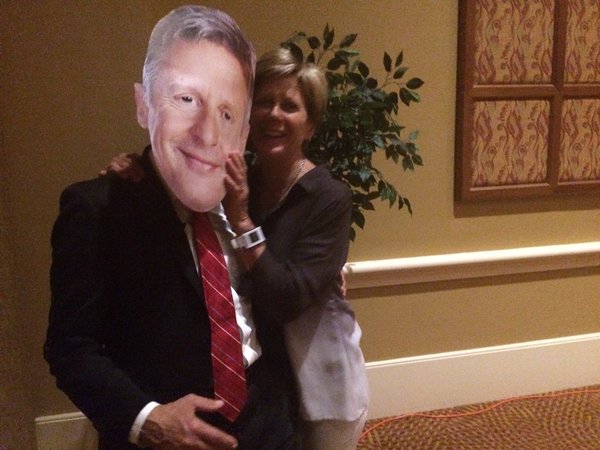Gary Johnson Taking the Same Support from Clinton as Trump
Don't assume that the Libertarian is only poaching Republicans


It's the number-one question people ask about the electoral prospects of the country's leading third party: "Could Libertarian Gary Johnson Play the Spoiler in November?" Behind the query is the assumption that, in the words of The Fiscal Times, the Johnson/William Weld ticket is "playing to the advantage of former secretary of state Hillary Clinton." But that assumption runs contrary to national polling data thus far.
Since the beginning of May, there have been 10 national presidential polls that have included Gary Johnson. His average support in them has been a robust-for-a-Libertarian 8.2 percent, including 9.0 percent in June. But of the nine such polls that also asked the same respondents how they'd vote in just a Clinton vs. Trump, an interesting pattern emerges:
44%-39%, Hillary Clinton vs. Donald Trump, without Gary Johnson
41%-36%-8%, Clinton-Trump-Johnson
So Clinton's lead remains the same, as each major-party candidate loses three percentage points of support.
What happens when you add the Green Party's Jill Stein? Well, there have only been three such polls (including one released today) that also measure results without the smaller-party candidates, and they show this:
44%-38%, Clinton vs. Trump
40%-35%-5%-3%, Clinton-Trump-Johnson-Stein
The impact on the two-party split is once again negligible, with Hillary's lead shrinking by a statistically insignificant percentage point.
What explains such an even split? Libertarian National Committee chair Nicholas Sarwark told me during the Party's convention last month that, roughly speaking, Libertarian candidates these days pull about one-third each from Democrats, Republicans, and people disinclined to vote for either of the major parties. This thesis is being borne out by initial polling: Of the seven national presidential surveys here that also measured the response of "other," the insertion of Johnson into the race knocked Planet Other down from 9 percent to 5 percent (remove the rounding and the split is closer to four percentage points). And among the polls that measured it, the percentage of people responding "not voting" also went down with Johnson, from 6 percent in the two-party matchup to 5 percent with him.
It's early yet, polls are only now digesting the end of the Democratic race, and we need a lot more survey data to feel confident about conclusions, but for now when someone tells you that Gary Johnson is spoiling it for Republicans, that someone is making an assertion not backed by any evidence.
After the jump, enjoy our interview with Nicholas Sarwark:


Show Comments (240)